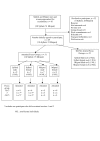Securing recruitment and obtaining informed consent in minority ethnic groups in the UK
- PMID: 18373876
- PMCID: PMC2311303
- DOI: 10.1186/1472-6963-8-68
Securing recruitment and obtaining informed consent in minority ethnic groups in the UK
Abstract
Background: Previous health research has often explicitly excluded individuals from minority ethnic backgrounds due to perceived cultural and communication difficulties, including studies where there might be language/literacy problems in obtaining informed consent. This study addressed these difficulties by developing audio-recorded methods of obtaining informed consent and recording data. This report outlines 1) our experiences with securing recruitment to a qualitative study investigating alternative methods of data collection, and 2) the development of a standardised process for obtaining informed consent from individuals from minority ethnic backgrounds whose main language does not have an agreed written form.
Methods: Two researchers from South Asian backgrounds recruited adults with Type 2 diabetes whose main language was spoken and not written, to attend a series of focus groups. A screening tool was used at recruitment in order to assess literacy skills in potential participants. Informed consent was obtained using audio-recordings of the patient information and recording patients' verbal consent. Participants' perceptions of this method of obtaining consent were recorded.
Results: Recruitment rates were improved by using telephone compared to face-to-face methods. The screening tool was found to be acceptable by all potential participants. Audio-recorded methods of obtaining informed consent were easy to implement and accepted by all participants. Attrition rates differed according to ethnic group. Snowballing techniques only partly improved participation rates.
Conclusion: Audio-recorded methods of obtaining informed consent are an acceptable alternative to written consent in study populations where literacy skills are variable. Further exploration of issues relating to attrition is required, and a range of methods may be necessary in order to maximise response and participation rates.
Figures
Similar articles
-
Understanding Barriers and Facilitators for Ethnic Minority Groups to Audio Recording Recruitment Discussions in Clinical Trials: A Participatory Approach to Improving Informed Consent and Participation.Health Expect. 2025 Apr;28(2):e70210. doi: 10.1111/hex.70210. Health Expect. 2025. PMID: 40098296 Free PMC article.
-
Development of alternative methods of data collection in South Asians with Type 2 diabetes.Diabet Med. 2008 Apr;25(4):455-62. doi: 10.1111/j.1464-5491.2008.02401.x. Epub 2008 Feb 18. Diabet Med. 2008. PMID: 18294217
-
Involving South Asian patients in clinical trials.Health Technol Assess. 2004 Oct;8(42):iii, 1-109. doi: 10.3310/hta8420. Health Technol Assess. 2004. PMID: 15488164 Review.
-
Procedures of recruiting, obtaining informed consent, and compensating research participants in Qatar: findings from a qualitative investigation.BMC Med Ethics. 2014 Feb 4;15:9. doi: 10.1186/1472-6939-15-9. BMC Med Ethics. 2014. PMID: 24495499 Free PMC article.
-
Synthesis of researcher reported strategies to recruit adults of ethnic minorities to clinical trials in the United Kingdom: A systematic review.Contemp Clin Trials. 2019 Mar;78:1-10. doi: 10.1016/j.cct.2019.01.004. Epub 2019 Jan 8. Contemp Clin Trials. 2019. PMID: 30634035
Cited by
-
Culturally and Linguistically Diverse Populations in Medical Research: Perceptions and Experiences of Older Italians, Their Families, Ethics Administrators and Researchers.J Public Health Res. 2016 Apr 26;5(1):667. doi: 10.4081/jphr.2016.667. eCollection 2016 Apr 26. J Public Health Res. 2016. PMID: 27190978 Free PMC article.
-
Trial Forge Guidance 3: randomised trials and how to recruit and retain individuals from ethnic minority groups-practical guidance to support better practice.Trials. 2022 Aug 17;23(1):672. doi: 10.1186/s13063-022-06553-w. Trials. 2022. PMID: 35978338 Free PMC article.
-
Development and validation of an instrument to measure physician awareness of bioethics and medical law in Oman.BMC Med Ethics. 2021 May 22;22(1):65. doi: 10.1186/s12910-021-00619-1. BMC Med Ethics. 2021. PMID: 34022852 Free PMC article.
-
Tackling health literacy: adaptation of public hypertension educational materials for an Indo-Asian population in Canada.BMC Public Health. 2011 Jan 11;11:24. doi: 10.1186/1471-2458-11-24. BMC Public Health. 2011. PMID: 21223580 Free PMC article.
-
Does the availability of a South Asian language in practices improve reports of doctor-patient communication from South Asian patients? Cross sectional analysis of a national patient survey in English general practices.BMC Fam Pract. 2015 May 6;16:55. doi: 10.1186/s12875-015-0270-5. BMC Fam Pract. 2015. PMID: 25943553 Free PMC article.
References
-
- Hemingway H, Whitty CJ, Shipley M, Stansfield MS, Brunner E, Fuhrer R. Psychosocial risk factors for coronary heart disease in White, South Asian and Afro-Caribbean civil servants: the Whitehall II study. Ethn Dis. 2001;11:391–400. - PubMed
-
- Erens P, Primatesta P, Prior G. Health Survey for England: The health of minority ethnic groups. London, Department of Health; 2001.
-
- Baradaran H, Knill-Jones R. Assessing knowledge, attitudes and understanding of Type 2 diabetes amongst ethnic groups in Glasgow, Scotland. Pract Diab Int. 2004;21:143–148. doi: 10.1002/pdi.619. - DOI
Publication types
MeSH terms
LinkOut - more resources
Full Text Sources
Medical


